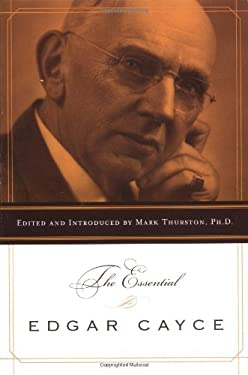There are many books out there about Edgar Cayce as well as books that summarize his readings about specific topics. One example is There is a River: The Story of Edgar Cayce by Thomas Surgrue. Thomas Surgrue received first a “life reading” from Cayce and later medical readings for his debilitating arthritis. From 1939 until 1941, the ailing Sugrue lived with the Cayce family in Virginia Beach, and completed this biography while convalescing. It is the sole biography written of Cayce during his lifetime.
Another Examples is Edgar Cayce: An American Prophet by Sydney D. Kirkpatrick. Kirkpatrick offers the reader in this biography a different perspective on his life and legacy. It is easy to read and has fascinating details about Cayce’s private life and work as a psychic and the author had unrestricted access to all of Cayce’s letters and papers. Examples for books covering a specific topic is Edgar Cayce’s Atlantis by Gregory and Laura Little and John Van Auken. There are also books containing the readings pertaining to a specific topic such as Reincarnation & Karma (summarized on this website) or Edgar Cayce on Atlatnis I decided to write more about the book The Essential Edgar Cayce by Mark Thurston because the author beautifully summarizes the most important philosophical points from Cayce’s readings.
The Essence of the Cayce Philosophy is:
1) Everything is connected – all is one
Once we perceive this unity it is our challenge to apply this understanding as practical mystics.
2) Life is purposeful
Each of us is born with a personal mission, a “soul-purpose”. There is an aspect of service to soul-purpose.
3) Approach life as an adventure
Life is meant to be a playful search for the truth; it is research in the broadest sense of the word.
4) Be noncompetitive: show compassion
Nothing takes us away quicker from the sense of oneness, and therefore from our own soul-purpose, than the drive for competitiveness. Compassion is the capacity to be present for another person and experience how we are all really the same. It is a matter of feeling with another person, not taking responsibility for that person but being responsible and responsive to that person.
5) Take responsibility for yourself
Help is available but no one else can fix things for us. Ultimately each soul is accountable for itself. The principle of self-responsibility is a cornerstone of Edgar Cayce recommendations.
6) Look ahead rather the back
The present and the future cannot be understood outside the context of the past but in essence he was saying to always look ahead and never back and understand that you are going to come back again. We should make choices that will help create the best possible results in the next lifetime.
7) Changing anything starts with an ideal
Motives, purposes, and ideals are the center of Cayce’s psychology. If we want to change anything in life we have to start at the motivational level.
8) All time is one time
Sometimes we get hints about the deeper mysteries of time (e.g. a precognitive dream). If we pay close attention to our inner lives, we might find clues that time is more complex than we think.
9) Success cannot be measured by material standards
Measuring success, especially in terms of one’s soul, is elusive because we cannot use the same standards for measuring the internal and external life.
10) Courage is essential to any spiritual growth
High aspirations and ideals are not enough, we have to do something with them.
11) Evil is real and comes in many forms
- A lack of awareness – a deficit in conscious awareness
- Extremism – we need to watch for our own tendency to go to extremes
- Aggression and invasion – all human relations have the potential for these forms of evil
- Transformation – stay engaged with anything ungodly and keep working to transform it
- Rebellion and willfulness – we choose every day how to respond to evil; the focus is on our behavior – are we going against the impulse to bring the spirit into the material world.
12) Learn to stand up for yourself; learn to say no when it is needed
It is similar to self-assertion and setting boundaries.
Cayce was a significant pioneer in many disciplines that have gained widespread acceptance since his death:
The value of dreams as a tool for self-understanding and[tooltip title=”” content=”See also Memories, Dreams, Reflections by Jung under Psychology” type=”classic” ] guidance[/tooltip]. He saw dreams as a safe and reliable work to explore one’s own soul.
The importance of[tooltip title=”” content=”See also The Bhagavad Gita under Religion” type=”classic” ] meditation[/tooltip] as a spiritual discipline. He evolved an approach that was easy to apply to the Judeo-Christian world.
A perspective on[tooltip title=”” content=”See also Theosophy under Philosophy” type=”classic” ] reincarnation, karma, [/tooltip] and grace that is potentially acceptable to the Judeo-Christian world. He presents reincarnation as an inescapable reality of how the universe operates. Karma can be softened by the influences of grace available to all souls.
An approach to[tooltip title=”” content=”See also Why Astrology can Help Us under Science” type=”classic” ] astrology[/tooltip] that recognizes past lives and the influence of the planets, especially with regard to helping people find a sense of purpose in life. He used the influence of the planets as a way of describing innate temperament and its impact upon the personality and aptitude.
According to Cayce’s readings we live in an orderly universe that is governed by universal laws. Humanity has a purposeful place in this universe, and there is a plan for us as souls: to bring the qualities of spiritual life into the material world consciously. That plan requires that we make proper use of two great gifts that God has given each of us: a creative mind and a free will. He also emphasized the importance of staying healthy and that we take responsibility for our own lives
